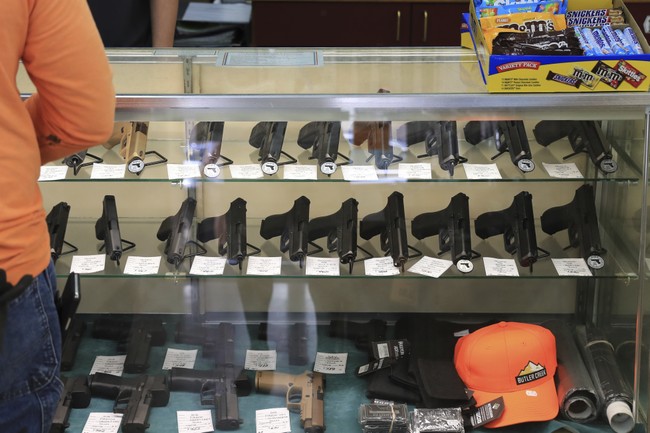New York’s ban on non-resident carry and the state of Hawaii’s prohibition on gun ownership for young adults are facing new legal challenges thanks to the Firearms Policy Coalition, the Second Amendment Foundation, and several gun owners who are suing over the infringements to their right to keep and bear arms.
FPC and four Pennsylvia residents have filed suit in federal court in New York, arguing that the state’s licensing scheme deprives them of their Second Amendment rights when they cross the border into the Empire State. New York doesn’t recognize any out-of-state concealed carry licenses, and only allows non-residents to apply for a New York permit if their principal place of employment is located inside the state’s borders. As FPC and the individual plaintiffs argue, such a policy squarely infringes on the right to keep and bear arms.
This Ban is unconstitutional. Citizens do not lose protection of their rights under the First Amendment’s speech or religion clauses when they cross state lines. Nor do they lose their protections under the Fourth Amendment’s prohibition on unreasonable searches and seizures. Likewise, they do not surrender their Second Amendment protected rights when they travel outside their home state. Cf. Bruen, 597 U.S.at 24 (the Bruen standard “accords with how we protect other constitutional rights”), id. at70 (observing “[w]e know of no other constitutional right that an individual may exercise only after demonstrating to government officers some special need”, contrasting New York State’s restrictions with operation of the First Amendment and Sixth Amendment).
The Supreme Court has cautioned against treating the Second Amendment as a second-class right, but that’s exactly what New York is doing with their permitting scheme. Given that non-residents will face severe challenges in obtaining the New York-specific training and licensing mandates, I’d argue that even allowing non-residents to apply for a New York permit doesn’t go far enough to satisfy the protections of the Second Amendment, but that would at least be a start in getting full recognition for our right to bear arms from the federal courts.
Hawaii is another state that neither allows non-residents to apply for a carry permit or recognizes out-of-state permits, but it’s the state’s prohibition on gun possession by young adults that’s the subject of new litigation filed by the Second Amendment Foundation and four other plaintiffs; two individuals who’d like to be able to exercise their Second Amendment rights, along with two gun shops who want to be able to sell their lawful products to legal adults.
In their complaint, SAF and the other plaintiffs say that Hawaii’s refusal to recognize the Second Amendment when it comes to young adults goes far being mere abuse of a constitutional right.
Defendant has flat-out denied Plaintiffs their rights to be armed inside and outside of their homes by establishing an onerous permitting regime replete with subjective and discretionary decisions, poll tax-like fees, and as applicable to this lawsuit, an outright ban on the acquisition, sale, purchase, ownership and possession of firearms and ammunition by adults under 21, and it has also unconstitutionally interfered with and blocked otherwise lawful commerce between DCT and JGB and adults under 21 who desire to, intend to and would otherwise purchase and acquire ownership of firearms and ammunition but for State’s adults under 21 prohibitions;
The plaintiffs note the Supreme Court has held that the right to carry cannot be restricted absent “exceptional circumstances. If that’s the case for the right to bear arms, then “certainly the right to acquire, own and possess similarly is presumptively protected from restriction, and an outright ban is unconstitutional,” since being an adult under the age of 21 is not an “exceptional circumstance”.
The right to keep and bear arms is one guaranteed to “the people,” and the Supreme Court has suggested that phrase, at a minimum, encompasses those members of the political community. You can vote, be drafted, and serve on a jury at the age of 18, so why shouldn’t an 18, 19, or 20-year-old be able to keep and bear arms as well? The state of Hawaii doesn’t deprive young adults of their First Amendment right to speak freely, petition the government, or worship. It doesn’t declare their Fourth Amendment rights to protection from unreasonable searches and seizures null and void until their 21st birthday. It’s only the right to keep and bear arms that’s treated as a privilege reserved for adults 21 and older, and that simply doesn’t fit with the text of the Second Amendment or the national tradition of gun ownership in this country.
In the years since Bruen was handed down by the Supreme Court, states like New York and Hawaii have continued to flagrantly infringe on our right to keep and bear arms. Both Shaffer v. Quattrone and Pinales v. Lopez are important challenges that will hopefully remedy some of these abuses, and FPC and SAF should be applauded for refusing to let lawmakers get away with their repeated attacks on the Second Amendment.
Read the full article here


